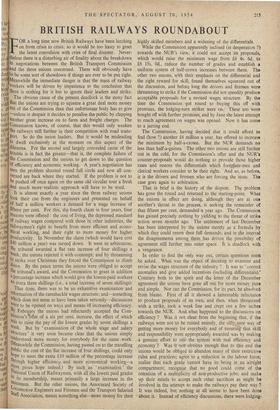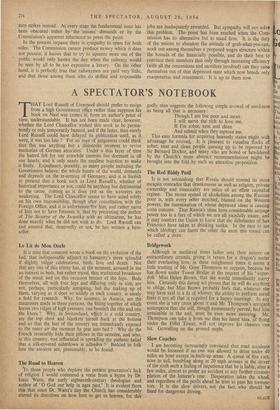BRITISH RAILWAYS ROUNDABOUT
FOR a long time now British Railways have been lurching on from crisis to crisis; so it would be too hasty to greet the latest convulsion with cries of final disaster. Never- theless there is a disturbing air of finality about the breakdown in negotiations between the British Transport Commission and the three unions concerned. There will obviously have to be some sort of showdown if things are ever to be put right. Meanwhile the immediate danger is that the mass of railway 'IN _ Workers will be driven by impatience to the conclusion that )cni‘ there is nothing for it but to ignore their leaders and strike.
The obvious cause of the present deadlock is the stony fact that the unions are trying to squeeze a great deal more money out of the Commission than that unfortunate body has to give —unless in despair it decides to penalise the public by clapping another great increase on to fares and freight charges. The Commission knows, of course, that this would only weaken the railways still further in their competition with road trans- Port. So do the union leaders. But it would be misleading to dwell exclusively at the moment on this aspect of the dilemma. For the second and largely concealed cause of the trouble is in fact the greater—that is, the complete failure of the Commission and the unions to get down to the question Of efficiency and economic Working. A year's negotiation has seen the problem shunted round full circle and now all con- cerned are back where they started. If the problem is not to be pushed off once again on the same old circular tour a fresh and much more realistic approach will have to be tried.
It is almost exactly a year since the three railway unions took their cue from the engineers and presented on behalf of half a million workers a demand for a wage increase of fifteen per cent. For this, the fourth claim in four years, four reasons were offered : the cost of living, the depressed standard of railway wages compared with those in other industries, the railwaymen's right to benefit from more efficient and econo- mical working, and their right to more money for higher Productivity. In November the claim (which would have cost £40 million a year) was turned down. It went to arbitration; the tribunal awarded a flat rate increase of four shillings a Week; the unions rejected it with contempt; and by threatening to strike over Christmas they` forced the Commission to climb down. By the peace terms the unions Were obliged to accept the tribunal's award, and the Commission to grant in addition a percentage increase which would give the lowest-paid workers an extra three shillings (i.e., a total increase of seven shillings).
That done, there was to be an exhaustive examination and reformation of the ramshackle wages structure; and—something Which does not seem to have been taken seriously—discussions ,Were to be opened on ways and means of increasing efficiency. ctY February the unions had reluctantly accepted the Corn- Intssion's%ffer of a six per cent. increase, the effect of which Was to raise the pay of the lowest grades by seven shillings a Week. But by ' examination of the whole wage and salary structure' it very soon became clear that the unions simply understood more money for everybody for the same work. (Meanwhile the Commission, having passed on to the travelling public the cost of the fiat increase of four shillings, could only ',°Pe to meet the extra £10 million of the percentage increase through higher efficiency and more economical working—a most pious hope indeed.) By such an ' examination' the . National Union of Railwaymen, with all the lowest paid grades In, Its membership, meant primarily a large increase in the minimum; But the other unions, the Associated Society of 1,°eornotive Engineers and Firemen and the Transport Salaried 'tall Association, meant something else—more money for their highly skilled members and a widening of the differentials.
While the Commission apparently inclined (in desperation ?) towards the NUR's view, it could not accept its proposals. which would raise the minimum wage from £6 4s. 6d. to £6 15s. Od., reduce the number of grades and establish a uniform system of half-crown increases between them. The other two unions, with their emphasis on the differential and the right reward for skill, found themselves squeezed out of the discussion, and before long the drivers and firemen were threatening to strike if the Commission did not speedily produce acceptable proposals for a revised wages structure. By the time the Commission got round to buying this off with promises, the lodging-turn strikes were on. These too were bought off with further promises, and by June the latest attempt to reach agreement on wages was opened. Now it has come to a jarring end.
The Commission, having decided that it could afford to find (how ?) another £6 million a year, has offered to increase the minimum by half-a-crown. But the NUR demands no less than half-a-guinea. The other two unions are still further out in the cold, for the Commission's offer and the NUR's counter-proposals would do nothing to provide those higher rates and restore the differentials which footniate-men and clerical workers consider to be their right. And so, as before. it is the drivers and firemen who are forcing the issue. The case goes again to arbitration.
That in brief is the history of the dispute. The problem has gone the round and returned to the starting-point. What the unions in effect are doing, although they are at one another's throat in the process, is seeking the remainder of that fifteen per cent. demanded a year ago. The Commission has gained precisely nothing by yielding to the threat of strike action seven months ago. The settlement of last December has been interpreted by the unions merely as a formula by which they could renew their full demands; and in the interval the disagreements among them has driven the possibility of agreement still further into outer space. tt is deadlock with a vengeance.
In order to find the only way out, certain questions must be asked. What was the object of deciding to examine and revise the wages structure of the industry ? It was to ' correct anomalies and give added incentives (including differentials).' Contrary both to the spirit and the letter of the December agreement the unions have gone all out for more money pure and simple. Nor can the Commission, for its part, be absolved from blame. First of all it showed a lamentable reluctance to produce proposals of its own, and then, when threatened with a strike, took a weak line and crept out a few inches towards the NUR. And what happened to the discussions on efficiency ? Was it not clear from the beginning that, if the railways were not to be ruined entirely, the 0."1"‘, sure way of getting more money for everybody and of ensuring that skill and responsibility were appropriately awarded was by making , a genuine effort to run the system with real efficiency and _economy ? Was it not obvious enough that to this end the unions would be obliged to abandon many of their restrictive rules and practices; agree to a reduction in the labour force; realise that each grade cannot have its being in an airtight compartment; recognise that no good could come of the retention of a multiplicity of non-productive jobs; and make up their minds to accept such other sacrifices as might be involved in the attempt to make the railways pay their way ?
It was indeed, but nothing at all seems to have been done about. it. Instead of efficiency discussions, there were lodging- turn strikes instead. At every stage the fundamental issue has been obscured either by ' the unions' demands or by the Commission's apparent reluctance to press the point.
In the present impasse there is sympathy to spare for both sides. The Commission cannot produce money which it does not possess; it knows that to try to squeeze more out of the public would only hasten the day when the railways would be seen by all to be too expensive a luxury. On the other hand, it is perfectly true that railwaymen are paid very little, and that those among them who do skilled and responsible jobs are inadequately rewarded. But sympathy will not solve this problem. The point has been reached when 'the Com- mission has no alternative but to stand firm. It is the duty of the unions to abandon the attitude of grab-what-you-can, work out among themselves a proposed wages structure within the bounds of the financially possible, and do their best to convince their members that only through increasing efficiency (with all the concessions and sacrifices involved) can they raiso themselves out of that depressed state which now breeds only exasperation and resentment. It is up to them now.



































 Previous page
Previous page